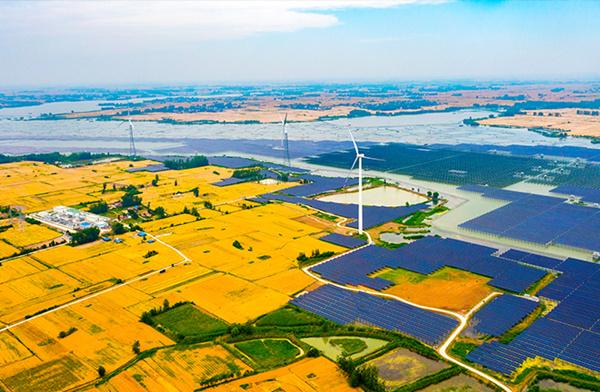Humanities and social sciences display ‘ecological’ trend

Windmills stand in the middle of wheat fields and photovoltaic fields in Sihong County, Jiangsu Province, on May 27, 2021. Photo: CFP
Interdisciplinary studies related to ecology have attracted mounting attention, and fields such as ecological philosophy, ecological aesthetics, ecological literature, ecological economics, and ecolinguistics are multiplying. What common theoretical resources are shared among these disciplines? What impact does the concept of ecological civilization have on traditional disciplines of the humanities and social sciences?
As environmental humanities and social sciences are entering a new phase with unprecedented vigor, scholars are expected to promote “ecological” studies of the humanities and social sciences under the guidance of Marxist stances, viewpoints, and methodologies, striving to form a new pattern of modernization in which man and the nature coexist harmoniously and move toward a socialist ecological civilization.
Ecological trend
The humanities and social sciences have seen an obvious “ecological” research trend, forming a series of “ecologically-related” disciplines, said Zhang Yunfei, a professor from the School of Marxism Studies at Renmin University of China. In a strict sense, the phenomenon appears due to ecological science’s progression from subdisciplines to universal scientific paradigms. Ecological science has become a universal scientific approach and scientific concept, building a bridge between natural sciences and social sciences. Within this framework, man and nature, or society and nature, are taken as an inseparable organic whole. Broadly, this ecological trend is inextricably linked to the popularity of ecological concepts.
German biologist Ernst Haeckel (1834–1919) proposed “ecology” in 1866, laying a common theoretical basis for interdisciplines related to ecology, said Wang Xiaohua, a professor from the School of Humanities at Shenzhen University. Haeckel’s “ecology” was expressed philosophically within his monograph The Riddle of the Universe, which was published in 1899. By the second half of the 20th century, ecological discourse had influenced the construction of almost all disciplines, leading scholars to establish ecological economics, ecolinguistics, ecological poetics, and many other interdisciplines.
There is unprecedented vibrancy in the development of environmental humanities and social sciences, and its subdisciplines are already well-established, said Xun Qingzhi, a professor from the School of Marxism at Peking University. Generally speaking, environmental social sciences are more affected by environmental humanities, such as the strong influence of environmental philosophy and ethics on environmental economics. Moreover, branches under the same discipline show disparate theoretical orientations due to their different relationships with ecological philosophy and ethics. This is the case in environmental economics and ecological economics, and in environmental aesthetics and ecological aesthetics.
Research paradigms
Ecological concepts have led the transformation of research paradigms, from a human-centered research paradigm to one that respects all life, Wang noted. The concept has augmented the disciplinary intersection of humanities and social sciences and lifted their research goals—now, goals not only focus on the interests of mankind, but also guard the well-being of all life.
Xun pointed out that traditional humanities and social sciences have displayed an “ecological” trend to various degrees, and become increasingly ecologically sensitive, which is a generally positive trend in international academia.
Zhang took ethics as an example. Although traditional Chinese ethics has a fine tradition of “respecting people and all things in the world,” for a very long period it only regarded ethics as studying moral rules and evaluation systems for relationships between people and people, or between people and society. Ecological morals were excluded from the ethical system, or merely encompassed in the scope of applied ethics. However, as the concept of ecological civilization filters into ethics, ecological ethics and environmental ethics have become important ethical disciplines. Many scholars have gradually redefined ethics as the study of moral standards and evaluation systems for relationships between people and people, people and society, and man and nature.
Ways forward
Considering requirements for cultivating environmental awareness and ecological civilization education, the ecological portion of China’s mainstream disciplinary education is still inadequate. Furthermore, education in the environmental humanities and social sciences lacks comprehensiveness and depth. For instance, it is troublesome to merely view ecological environments as a new means of economic enrichment or to completely avoid modern civilization. In contemporary society, each and every social subject should receive increasingly extensive education concerning environmental humanities and social sciences, in order to regulate their own production and lives, Xun suggested.
Through the lens of Marxist world outlooks, man and nature are an inseparable organic whole, Zhang added. Based on this, the scientific concept of “fostering a community of life for man and nature” is creatively proposed by Xi Jinping’s thought on ecological progress. Considering our primordial nature, man and nature should be in a relationship of phylogenesis and co-evolution. As such, it is necessary to promote the ecological development of humanities and social sciences with such dialectical thinking as systematic thinking, relational thinking, and organic thinking.

 PRINT
PRINT CLOSE
CLOSE